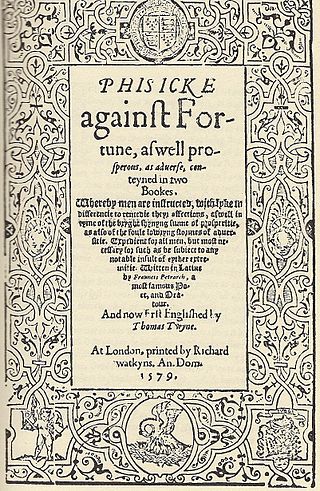Top Qs
Timeline
Chat
Perspective
De remediis utriusque fortunae
Collection of Latin dialogues written by Petrarch From Wikipedia, the free encyclopedia
Remove ads
De remediis utriusque fortunae ("Remedies for Fortunes") is a collection of 254 Latin dialogues written by the humanist Francesco Petrarca (1304–1374), commonly known as Petrarch.

Phisicke Against Fortune
book cover of 1579
book cover of 1579
The dialogues display remarkably lucid ideas that are cogently expressed. Drawing on classical sources, Petrarch expounded on refinement in taste and intellect, on finesse and propriety in speech and style.
The writing is a bouquet of moral philosophy, set out to show how thought and deed can generate happiness on the one hand, or sorrow and disillusionment on the other. In a recurring theme throughout the dialogues, Petrarch advises humility in prosperity and fortitude in adversity.[1]
The dialogue is a development of a type seen in Seneca's De remediis fortuitorum.
For 1520, Sebastian Brant was involved in publishing an edition in Strassburg.[2]
The 254 woodcut illustrations by the anonymous Master of Petrarch for the 1532 German edition are considered masterpieces of the German Renaissance.
In 1579, the dialogues were translated into English by the Elizabethan physician Thomas Twyne (1543–1613) as Phisicke Against Fortune, and by Susannah Dobson in 1791 as Petrarch's View of Human Life.[3]
Remove ads
References
External links
Wikiwand - on
Seamless Wikipedia browsing. On steroids.
Remove ads
